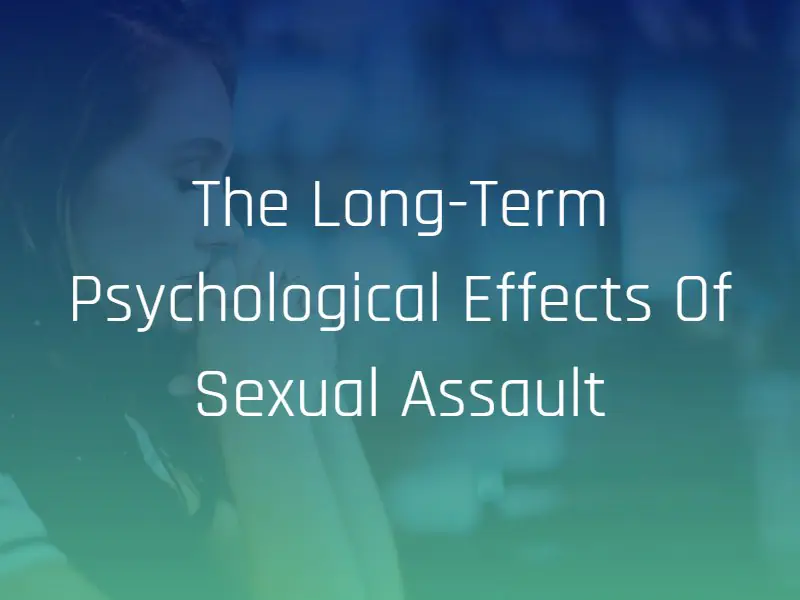Understanding the psychological effects of child sexual assault on victims is crucial for providing effective support and treatment to survivors, and seeking help from a qualified therapist or counselor can make a significant difference in their recovery process. Consider speaking to experienced Houston child sexual abuse lawyers Scheiner Law Group P.C. for more information.
In Texas, survivors of sexual assault often face long-lasting psychological effects, including anxiety, depression, and PTSD. According to the Texas Department of Public Safety, there were over 6,000 reported sex crimes in 2020 alone. The emotional trauma can be severe, with up to 80% of victims experiencing symptoms that persist for years after the attack.
Sexual assault leaves survivors with psychological scars that can linger for an extended period of time and affect different aspects of their lives significantly. It is essential to comprehend these enduring impacts to offer assistance and aid in the healing process.
Emotional Trauma
Survivors often go through distress following a traumatic event. Feelings of fear and shame can be overpowering for them. These emotions may trigger feelings of anxiety and depression, sometimes leading to traumatic stress disorder (PTSD). PTSD can show up as recurring flashbacks, nightmares, or intense feelings of anxiety. If left untreated, these symptoms can have an impact on everyday activities.
Trust Issues
One of the impacts of assault is the breakdown of trust that follows in its wake. Survivors frequently struggle to rely on those around them. Be it friends or family. This lack of faith also seeps into their partnerships making it tough to establish bonds. As a result, survivors might withdraw from interactions, fueling emotions of solitude and disconnection.
Self-Esteem and Identity
The experience of assault deeply affects how a survivor sees themselves, and their self-worth is often questioned as they may feel tarnished or broken inside. This detrimental self-view can impede the development and advancement in one’s career. Survivors may also face challenges with how they perceive their body image, which can result in adopting habits or developing eating disorders.
Coping Mechanisms
Survivors often find ways to deal with their trauma over time. Some may rely on substances like drugs or alcohol to numb their feelings. Others might resort to self-injury. While these actions can offer short-term relief, they end up worsening the anguish, leading to a cycle of suffering and self-inflicted harm.
Social Withdrawal
The aftermath of sexual assault frequently includes social withdrawal. Survivors might avoid social gatherings, fearing judgment or triggering memories of the assault. This withdrawal can lead to isolation and a lack of support, further intensifying feelings of depression and anxiety. Rebuilding social connections is vital for long-term recovery, but the path is often fraught with challenges.
Impact on Daily Functioning
Sexual assault can greatly impact a person’s life in many ways. Survivors may find it challenging to focus. This can affect their academic or work performance. Trouble sleeping is an issue after traumatic events, with some facing insomnia or recurring bad dreams. All of these challenges combined make it hard for individuals to live a successful life.
Relationship Challenges
Survivors face obstacles in relationships as they navigate trust issues and struggle with vulnerability and self-esteem issues that can impede the growth of strong partnerships. It can also be tough for survivors to cope with physical intimacy woes, which may strain relationships and cause turmoil. Dealing with these hurdles calls for patience and empathy.
Role of Therapy
Receiving therapy is crucial for healing after experiencing difficult life events or trauma. Approaches such as cognitive behavioral therapy (CBT) and trauma-focused therapy help individuals address emotional distress and develop effective coping mechanisms for improved well-being. Group therapy also offers a supportive environment where survivors can connect with others who have had similar experiences and gain valuable insights.
Support Systems
Survivors on the path to recovery rely heavily on a network of support to help them through their journey to well-being. Validation and hands-on help from friends and family go a long way in providing comfort and relief in times of need. It’s essential for loved ones to show empathy and kindness, which can truly lighten the load of dealing with trauma.
Empowerment and Advocacy
Empowerment and advocacy are essential components of the healing process. Survivors who engage in advocacy often find a sense of purpose and agency. Sharing their stories and raising awareness about sexual assault can be both therapeutic and empowering. Advocacy efforts contribute to societal change, fostering a safer environment for everyone.
Conclusion
The deep and lasting impact of sexual assault can have effects that deeply affect survivors emotionally and mentally in various ways. This could be in the form of struggles with trauma and trust issues among others in their daily lives. It is crucial for survivors to have access to therapy and a strong support network while empowering them through advocacy to aid in their healing journey and path to recovery. Recognizing these impacts plays a role in offering the assistance survivors need to rebuild their lives and overall wellness.



